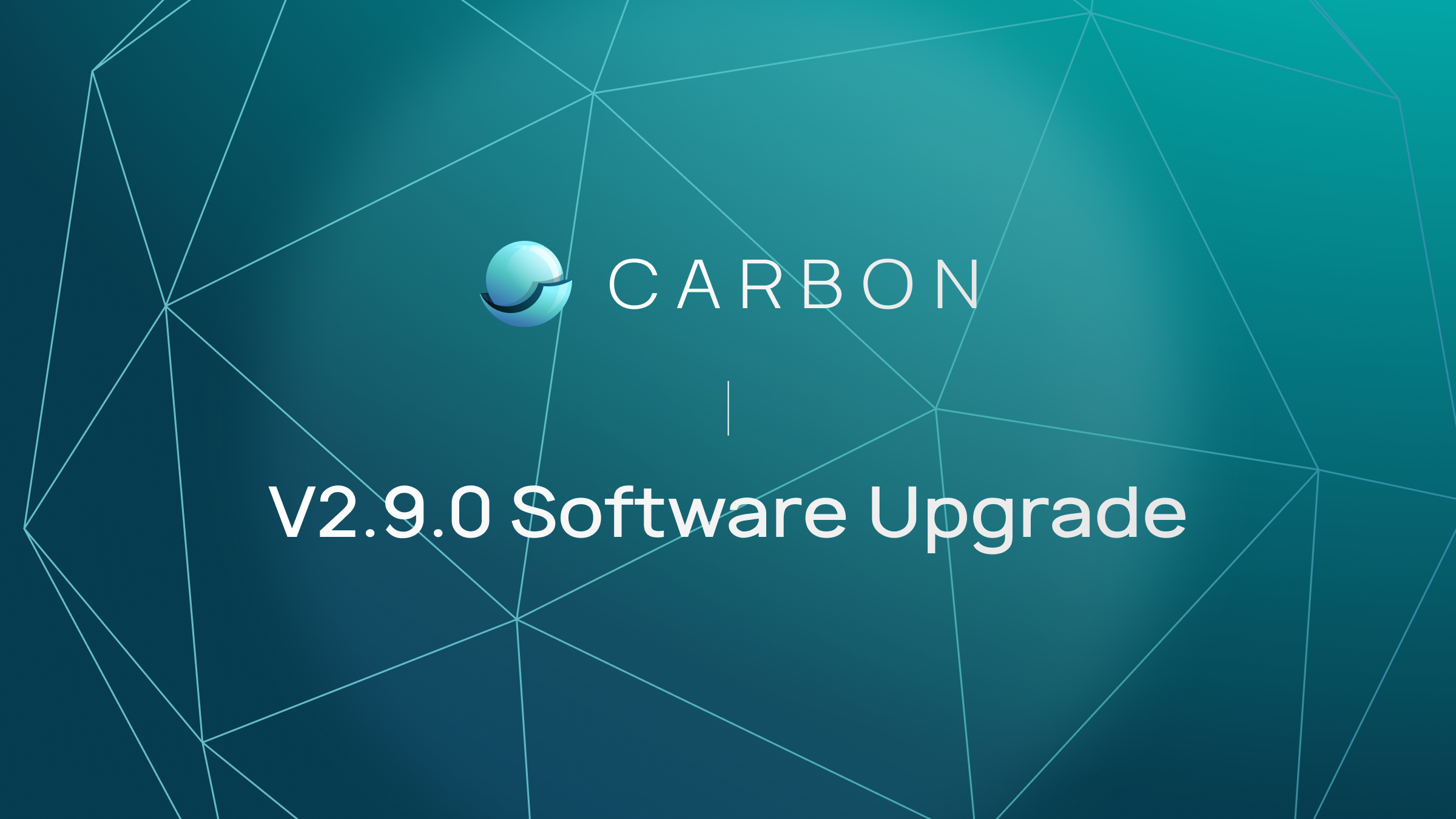Carbon Protocol has released its latest v2.9.0 software upgrade proposal on Commonwealth here.
Update: This software upgrade has been proposed via on-chain governance today, 6 September 2022. If passed, validators must complete the pre-upgrade steps by block height 31113322, which will happen around Thursday, September 8, 2022 6:43 PM, GMT+8.
At a glance: What Carbon already offers
- Carbon is optimized for trading-related execution paths, with near-instant confirmation times (~2s), and consistently high throughput of 5,000 TPS, being able to handle up to 10,000 TPS at peak demand.
- Network fees on the trading protocol are fixed per transaction, which reduces gas bidding wars, front-running and Miner Extractable Value (MEV).
- Users can easily make cross-chain transactions on Carbon, which is currently integrated with Cosmos Hub, Juno Network and Osmosis. Through Poly Network, the blockchain is also connected with Binance Smart Chain, Ethereum, Zilliqa and Neo.
- Spot and future markets can be created permissionlessly. The community has an actual say in the process of market and token listings.
Looking ahead: What Carbon is building
The v2.9.0 upgrade consists of the following new features:
- Perpetual Markets
- On-chain Referral Mechanism
- Flexible Network Fees
Perpetual Markets
If you’re new to the world of perpetuals, perhaps the first question that pops into mind is: Why perpetual swaps? Perpetual swaps come with a unique set of advantages —
(1) As with any other derivatives, the underlying asset is never traded, which means no custody issues (i.e. self-custody of assets). This way, you can gain exposure to an asset’s price movements without having to actually hold the asset itself, which can be time-consuming to set up securely (e.g. additional wallets required).
(2) Another benefit of perpetuals is that you can take advantage of markets that are falling in price as well as those that are rising – essentially, they enable you to short-sell (i.e. bet on downward movement of asset prices) without having to borrow the underlying asset.
This is a particularly important feature for hedgers, who need to be able to protect themselves against declining assets. See, for instance, BTC locked in liquidity pools.
(3) Unlike a typical dated futures contract, perpetual swaps do not have expiration dates. This means that you can hold the futures contract for as long as you want, without having to constantly roll over expiring contracts. In essence, this eliminates the need to constantly re-establish your position. For this reason, the price of perpetual contracts are anchored to and closely track the spot prices of their underlying assets with the help of a pricing mechanism known as funding rates.
Couple this with the fact that you can take on a position with varying degrees of leverage (Did someone say 50x?), and it’s not hard to see how powerful perpetual swaps can be for traders.
Ahead of the pack
While derivatives have long been invaluable instruments in traditional finance, the market for derivatives in decentralized finance (DeFi) is still largely in its infancy stage despite the plethora of financial products and services that have sprung up. This is because Layer 1 blockchains that currently dominate the DeFi space were not built with the intention of supporting complex programs such as sophisticated financial constructs.
As a scalable Layer 2 blockchain solution, Carbon can support almost any financial asset from derivatives to synthetic assets, without compromising security, speed or cost. Currently, Carbon already supports spot markets and dated futures on Demex, its reference UI, and with the launch of v2.9.0, Carbon is positioned to be the only perpetual decentralized exchange (DEX) with cash-settled futures that allows for a risk-free cash and carry trade in the Cosmos ecosystem.
On-chain Referral Mechanism
The on-chain referral mechanism allows dApps and user interfaces (UIs) built on the Carbon Network to attach a referral address to gain a percentage commission from trading fees. Commissions are earned when the referral address has successfully generated a new lead for the platform. The kickback mechanism implemented will enable referrers to assign a percentage of their trade referral rewards back.
This means that dApps / UIs such as Demex can now implement referral programs through this module. The dApps / UI can track the referral and referee addresses, and allocate referral rewards based on the current trader, or, direct all referral rewards into a common shared pool that is owned by the governance DAO / token of the dApp / UI.
Flexible Network Fees
Anyone in the DeFi scene would be no stranger to network fees; Network fees are fees paid for the usage of any blockchain, regardless of the transaction type. Typically, these fees would be denominated in the native token of the network that the transaction is taking place on (e.g. ETH on Ethereum, SWTH on Carbon).
Case in point: Previously, to execute any trade-related actions on Carbon, users incurred a flat fee of 1 SWTH. However, this does mean that newcomers to the ecosystem who do not yet hold $SWTH have to first acquire the token before they can start trading or using the features of the protocol. Acquiring these tokens can be inconvenient enough to become a deterrent to adoption. To ensure that new users of Carbon do not end up giving up on the onboarding process, Carbon v2.9.0 will enable the use of any native token in all of the supported Layer 1 chains, as well as popular stablecoins, as network fees.
In a move meant to compete with the experience of trading on centralized exchanges (CEXs), the support for flexible native token fee will provide traders a more straightforward user flow, bypassing the need to acquire the protocol’s native token before trading can take place. Very soon, traders on DEXs such as Demex will have the option to select tokens such as $ETH, $SWTH, $USDC or $BNB as network fees, so that they can begin trading immediately.
Leaning into the heart of DeFi
More perpetual markets will be added to Demex once more oracles are set up, kickstarting first with BTC/USD and ETH/USD markets.
Upcoming Trading Functionalities
- Permissionless listing (for perpetuals)
- Cross-margin
- Multi-collateral margin
- IBC assets as margin collateral
Users can expect cross-margin trading (rather than only isolated margin) as well as support for using multiple collaterals at the same time (e.g. USDC + ETH) on Carbon in the near future. Cross-margin trading allows the user’s full balance to be used across all open positions, while multi-collateral margin allows for the use of assets other than the settlement currency as collateral in our derivatives markets. Combined with our Orderbook + Liquidity Pool/Automated Market Makers (CLOB+LP/AMM) system, Carbon is primed to be the most advanced trading protocol in existence.
Upcoming Improvements
- Options
- AMM for Perpetual Swaps
- Money Market and native Stablecoin
For upcoming financial capabilities being developed on Carbon, check out the protocol roadmap.




